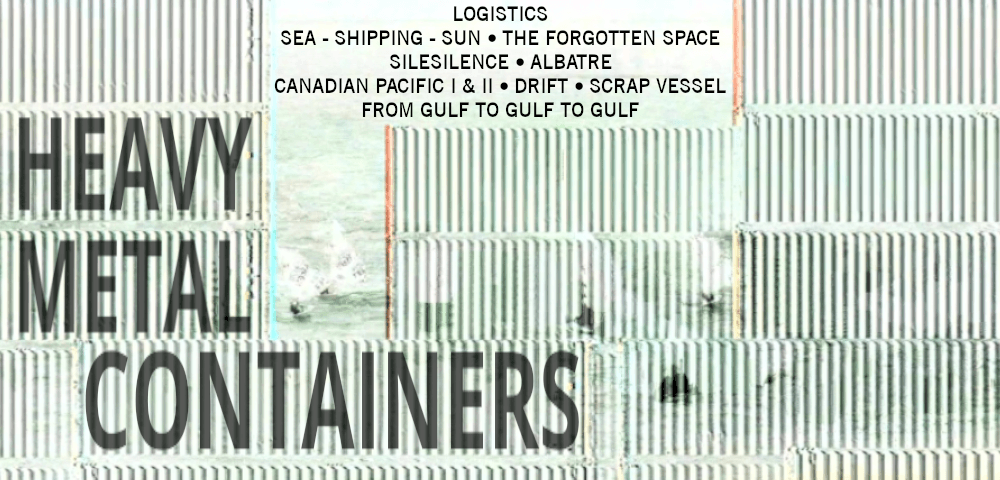
“But what might look like smooth sailing, flat waters, flat being, is not so undisturbed. Uncertainty surrounds the holding of things … logistics discovers too late that the sea has no back door.” –Stefano Harney and Fred Moten
Today it seems cargo ships, and the Lego-like corrugated metal boxes they hold, are in a state of perpetual high-profile catastrophe. This can be seen as recently as Iran’s seizure of the MSC Aries last April and the continued attacks of Yemeni rebels on vessels crossing the Red Sea (each in response to Israel’s ongoing decimation of Gaza), the Dali’s tragic collision into Baltimore’s Francis Key Bridge in March, or the Ever Given’s meme-able blockage of the Suez Canal in 2021. These hulking backbones of supply chains ensure the shipping and manufacturing of the often meaningless, outsourced consumer products that litter our lives. More than that, containers and their boats have changed the world as the foundations for an integrated, unsustainable global economy, yet they receive seldom attention until they become a media spectacle.
To understand the plight of the cargo ship is also to understand the plight of globalization, and thankfully there is an ever-growing filmography of underappreciated documentaries and artists’ films that do just that. While connoisseurs of experimental cinema may cite Peter Hutton’s opus AT SEA as the quintessential freighter symphony, other artists have gradually tracked the transformation of a romanticized maritime lifestyle into a precise corporatist regime of automation and mechanization.
This July, Spectacle provokes contemplation of the slow, inhuman, ever-constant churn of containerized matter across international waters with ten films, ranging from short to feature to colossal in length. LOGISTICS, a 52,420 minute Warholian document of a container ship’s transnational voyage, prompts a revival of Spectacle’s online streaming platform in order to show it in its entirety. Tuning in and out of the stream, viewers are welcome to the theater to gaze upon even more HEAVY METAL CONTAINERS through documentaries that cross into essay film (THE FORGOTTEN SPACE), ghost story (SCRAP VESSEL), science fiction (DEAD SLOW AHEAD), and computational compression art (ALBATRE). While a few of these films highlight the diverse and precarious human experiences of modern life at sea, this is most true of the delightful series outlier, FROM GULF TO GULF TO GULF, a film made in collaboration with seafarers transporting non-containerized cargo across the Western Indian Ocean aboard giant sailing vessels made of wood instead of steel.
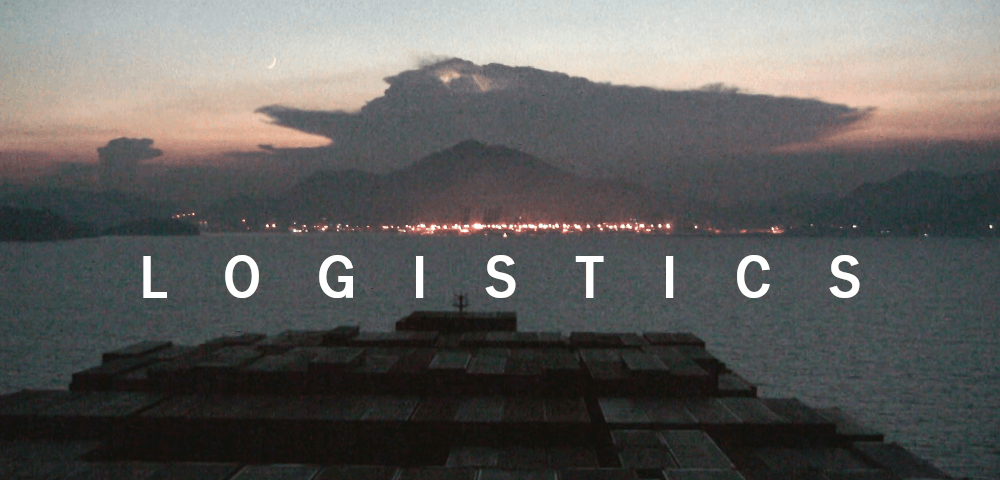
LOGISTICS
Dirs. Erika Magnusson and Daniel Andersson, 2012.
Sweden, Germany, Netherlands, Spain, China. 52,420 min.
Silent.
BEGINS MONDAY, JULY 1 – 6:30 PM
FRIDAY, JULY 26 – 7:30 PM – FREE IN-PERSON Q&A WITH FILM SCHOLAR KYLE STINE
ENDS MONDAY, AUGUST 5 PM
RSVP FOR FREE SPECIAL EVENT HERE!
“At the same time that André Bazin recognized cinema as ‘the instrumentality of a nonliving agent,’ he argued that it fulfilled a primordial human wish to preserve one’s likeness against the passage of time, the body of film standing in for the body of one’s material identity. For Hugo Münsterberg, photoplays reduplicated outside us the internal faculties of memory, imagination, and attention. For Epstein, film magnified for us. For Eisenstein, it shocked us. Theory throughout the celluloid era affirmed that all that was cinematic returned to us. Whatever commensurability must have been sustained to assure this mapping of viewer and image, however, appears to have slipped away in LOGISTICS, a film that, properly speaking, no human being can endure.” –Kyle Stine
Taking the meaning of slow cinema to its extreme at a runtime of 37 days and nights, LOGISTICS is as banal, unfathomable, and sublime to comprehend as global trade itself. The film outlines the reverse journey of a pedometer, from a warehouse in Sweden to a factory in China, the bulk of which is captured over a month from a fixed angle aboard the cargo vessel Elly Maersk –a member of the largest class of ships at the time of shooting. This raw real time transit is, of course, impossible to fully intake in a single sitting, or to appreciate as a lone spectator.
To screen LOGISTICS in any context requires an exercise of logistics itself, and thanks to the generosity and support of the filmmakers, Spectacle will showcase the film from a continuous stream on our website, beginning on July 1st at 6:30pm and ending on August 5th.
You will have the opportunity to watch Elly Maersk’s two-day stoppage in Spain due to a dock workers’ strike and the Arab Spring, its subsequent hours-long passage through the Suez Canal, and many more moments numbly bland and staggeringly beautiful. We encourage you to do so alongside eating, bathing, commuting, working, shitting, and any other activities you may think of. Please use the stream’s chat feature to make new friends and catch them up on anything they may have missed.
On Friday, July 26th at 7:30pm, scholar and foremost LOGISTICS expert Kyle Stine will visit the theater for a free lecture and conversation as the stream plays on screen. Stine will illuminate the dramatic stories behind the film’s production and its deeper implications regarding the limits of human spectatorship and cinema’s relation to supply chains.
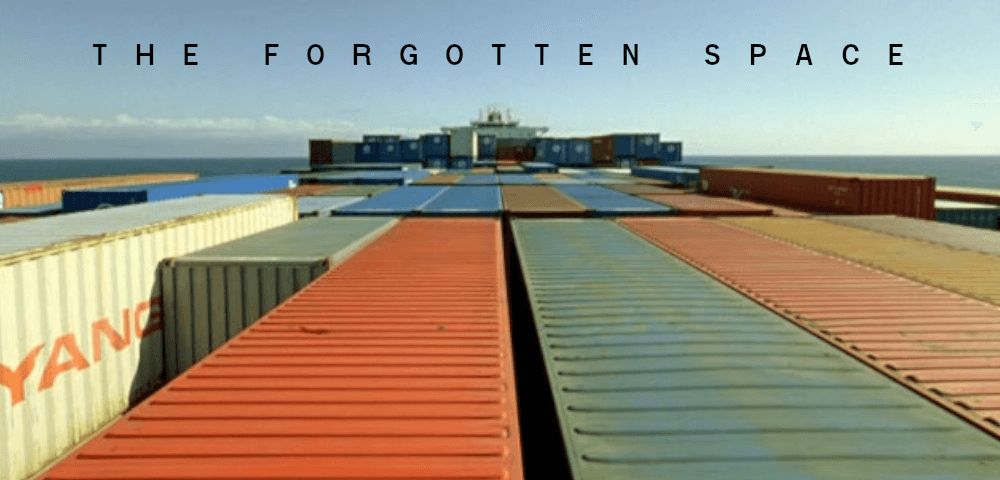
THE FORGOTTEN SPACE
Dirs. Allan Sekula and Noël Burch, 2010.
Austria, Netherlands, United States, China, Spain. 112 min.
In English, Dutch, Spanish, Korean, Indonesian, and Chinese with English subtitles.
FRIDAY, JULY 5 – 7:30 PM
THURSDAY, JULY 11 – 10 PM
TUESDAY, JULY 23 – 7:30 PM
SUNDAY, JULY 28 – 7:30 PM
“Those of us who travel by air, or who ‘go surfing’ on the Web, scarcely think of the sea as a space of transport any more. We live instead in the age of cyberspace, of instantaneous electronic contact between everywhere and everywhere else. In this fantasy world the very concept of distance is abolished. More than 90% of the world’s cargo moves by sea, and yet educated people in the developed world believe that material goods travel as they do, by air, and that money, traveling in the blink of an eye, is the abstract source of all wealth.” –Allan Sekula
Taking the sea itself as the titular forgotten space that globalization exploits to connect industrial production and distribution, Allan Sekula and Noël Burch’s humanizing investigation into the subject illuminates places and livelihoods simultaneously linked and contained from one another. These landscapes concern the changing worlds of Indonesian and South Korean seafarers, Dutch villagers, homeless encampment and truck drivers in Los Angeles, young Chinese factory workers, and more whose experiences intersect with the transport of ISO shipping containers. As Sekula’s sharp Marxist commentary contends, the standardization, flow, and interdependence that these metal boxes have wrought is a recipe for ruination. While despairing in these insights, the filmmakers’ deft mixing of archival footage, interviews, and stunning cinematography find frequent patches of humor, warmth, and even hope.
Preceded by
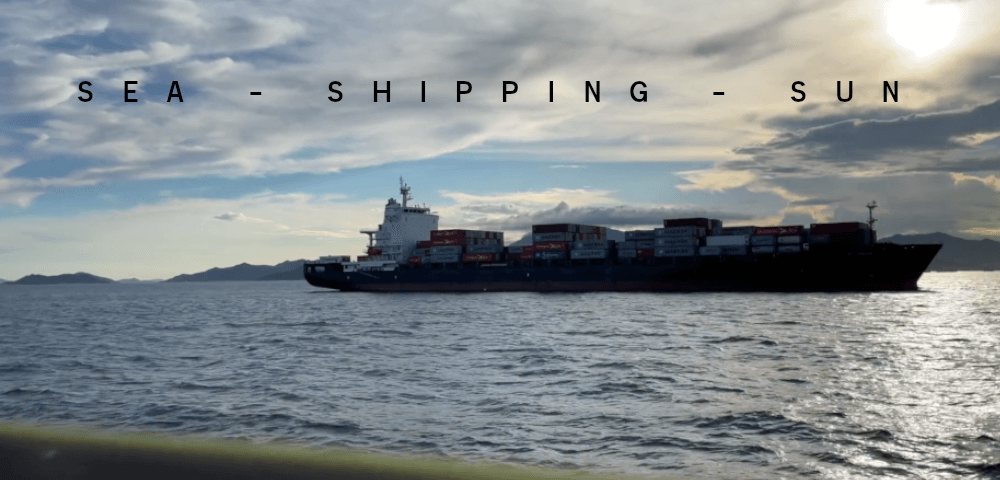
SEA – SHIPPING – SUN
Dirs. Tiffany Sia and Yuri Pattison, 2021.
Hong Kong, United Kingdom. 11 min.
Filmed over the course of 18 months from 2019 to the onset of the pandemic-era global supply chain crisis in 2021, SEA – SHIPPING – SUN is a lulling portrait of the sea shot in a period of dramatic geopolitical shifts. Set to archival recordings of BBC 4 shipping forecasts, the camera observes container ships along the coast of Hong Kong from the vantage point of ferries as they move in and out of frame, from sunrise to sunset.
The daily UK shipping forecast has a beloved reputation for inducing sleep and relaxation due its calm, repetitive vocal delivery of name places and weather patterns meant to keep seafarers informed. The recordings selected for the film remain soothing as ever while marking turning points in global politics: the Brexit referendum on June 23, 2016 and the passing of Chris Patten’s Hong Kong electoral reform bill on June 30, 1994. In 2020, June 30 was both the deadline for EU citizens to apply to live in the United Kingdom and when the Hong Kong national security law passed, following the 2019 anti-extradition bill protests. However stable and nostalgic the shipping forecast is as a cultural fixture, international commerce is anything but.
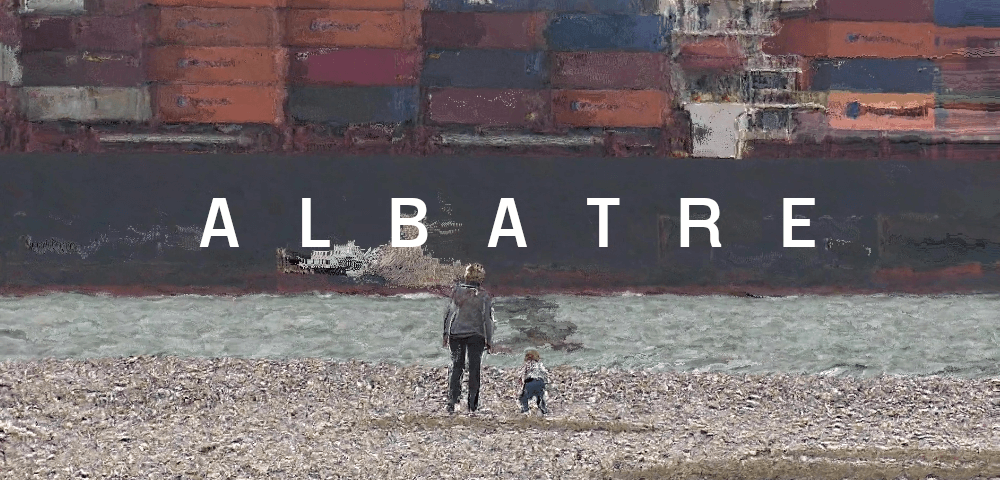
ALBATRE
Jacques Perconte and Carlos Grätzer, 2018.
France. 42 min.
MONDAY, JULY 1 – 10 PM
THURSDAY, JULY 11 – 7:30 PM
SUNDAY, JULY 14 – 5 PM with virtual filmmaker Q&A (This event is $10.)
WEDNESDAY, JULY 24 – 10 PM
Coastal and pastoral landscapes of northern France blend and pixelate into one another in Jacques Perconte’s signature compression-based digital aesthetic. While images seemingly grafted to the breaking of tides and trembling of grass unfurl into painterly strokes and dizzying abstractions, the intrusion of titanic cargo ships into these environments make up an extended centerpiece sequence, offering a rare cinematic turning of digital images back onto their logistical origins. Accompanied by a dissonant electronic score from Argentinian composer Carlos Grätzer.
Jacques Perconte will be tele-present for a virtual Q&A following the 5pm screening on Sunday, July 14th.
Preceded by
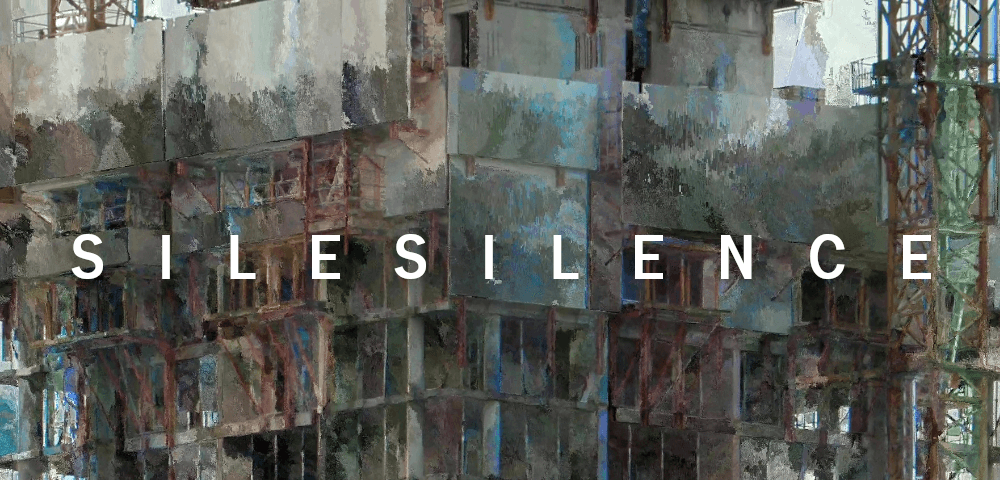
SILESILENCE
Jacques Perconte and Julien Desprez, 2022.
Netherlands. 16 min.
In French with English subtitles.
Filmed along the ports of Rotterdam –where Sekula and Burch’s FORGOTTEN SPACE begins– SILESILENCE offers a panoramic glide through an interlocking industrial hellscape formed in ash-like brushstrokes. Bookended by voice over poetry readings by Perconte and Myriem Bayad and set to an uncompromising, eardrum shattering noise soundtrack by Julien Desprez.
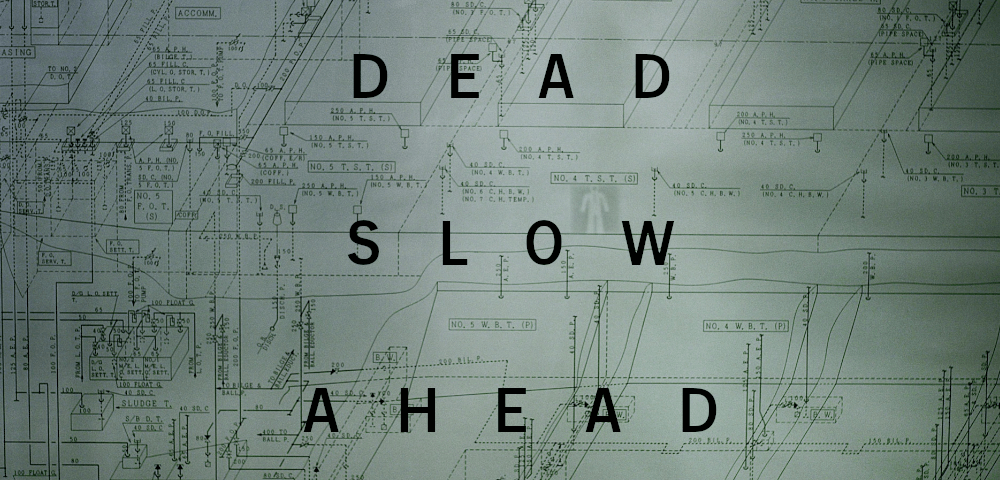
DEAD SLOW AHEAD
Dir. Mauro Herce, 2015.
France, Spain. 74 min.
In Tagalog with English subtitles.
FRIDAY, JULY 5 – 10 PM
WEDNESDAY, JULY 10 – 7:30 PM
MONDAY, JULY 15 – 10 PM
SATURDAY, JULY 20 – 5 PM
Somewhere at sea, the Fair Lady and its Filipino crew are shipping bulk loads of grain across seascapes strewn with magnificent thunder storms and radiant shafts of sunlight. The men take breaks from their grueling work with attempts to call distant family members and partake in late-night, close-quarters karaoke parties. Meanwhile, the Fair Lady hums its own low unknowable tunes from deep within. Blueprints of the boat do not imply a lifeless vehicle, but an immense and delicate leviathan. As a catastrophe threatens this ecosystem’s flesh-metal symbiosis, we see that the beast not only holds lonely seamen, but nested landscapes far more alien than the world outside.
“Director Mauro Herce, principally known as a cinematographer, has sculpted an aesthetically aberrant documentary that, while grounded in the vicissitudes of uneasy labour, effectively partakes of science fiction … Not just another boat movie, DEAD SLOW AHEAD approximates the forgotten spaces of an Allan Sekula polemic as if corrupted by a David Lynch fever dream.” –Jay Kuehner
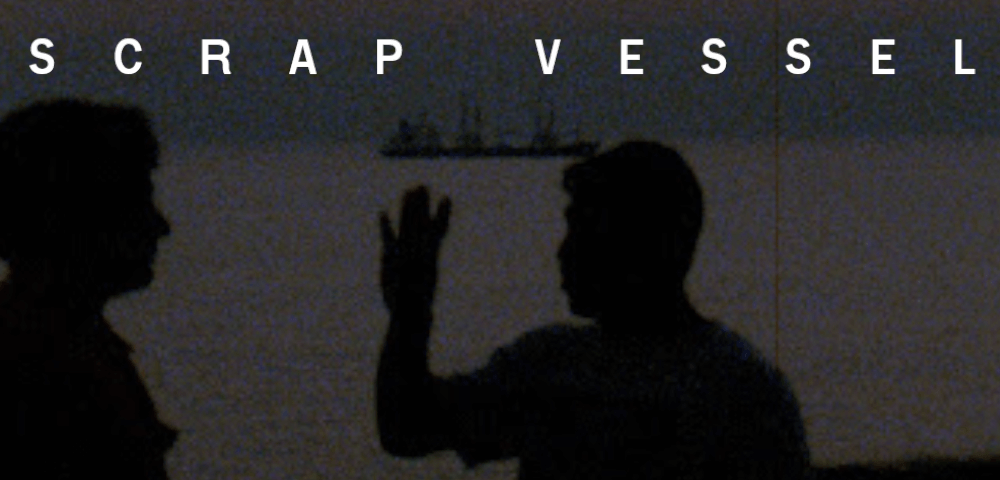
SCRAP VESSEL
Dir. Jason Byrne, 2009.
United States, Singapore, Bangladesh. 51 min.
In English, Mandarin, Bangla, and Hindi with English subtitles and intertitles.
MONDAY, JULY 8 – 7:30 PM
SATURDAY, JULY 13 – 5 PM with virtual filmmaker Q&A (This event is $10.)
THURSDAY, JULY 25 – 10 PM
WEDNESDAY, JULY 31 – 10 PM
SCRAP VESSEL details the death and memories of a haunted Chinese coal freighter ship named Hupohai (formerly the Bulk Promotor during the start of its life in Norway) during its terminal passage from Singapore to the scrap yards of Bangladesh. Shot on 16mm that was rephotographed repeatedly to generate deep grainy contrasts, Byrne creates a fragmentary visual diary of his exploration of the near-derelict behemoth, where he and the crew uncover an archive of photographs, music tapes, and film reels left behind by Hupohai’s former residents. While the the trip to Chittagong may recall the conclusion to Peter Hutton’s 2007 AT SEA, Byrne shot SCRAP VESSEL three and half years prior and spent the subsequent years figuring out how to assemble its footage. The result is starkly unique in its sombre, gothic qualities, elevated by Albert Ortega’s ambient score.
Jason Byrne will be tele-present for a virtual Q&A following the 5pm screening on Saturday, July 13th.
Preceded by
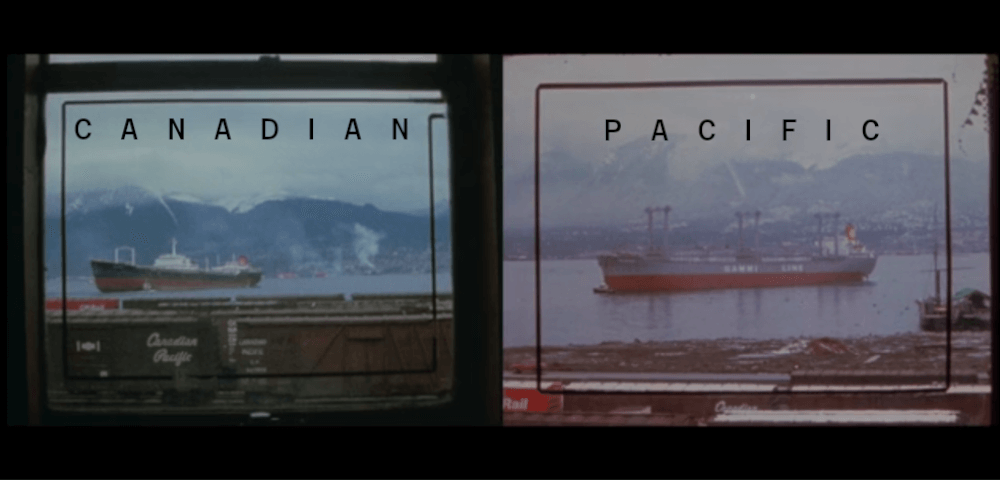
CANADIAN PACIFIC I & II
Dir. David Rimmer, 1974/1975.
Canada. 11 min.
Silent. Digitized single-channel composite of a dual-projection presentation.
David Rimmer –who along with Michael Snow’s passing in 2023 left a towering legacy in the history of Canadian experimental film– is often celebrated for his gorgeous structural diptych CANADIAN PACIFIC I & II. Shot a year apart from neighboring warehouses overlooking the titular railroad along Vancouver’s bay, visible interior window frames outline both films as three months of winter timelapse and dissolve by. Between blizzards and the monumental vistas of clear days, hulking ships take center view. In the foreground, trains pass in a constant stream, sometimes carrying break-bulk cargo, but more often recognizable corrugated boxes.
The film aspires to be a study in depth and the fluid horizontals of railroad, bay, mountain-scape, and sky. While a beautiful formal exercise not based on any economic or political analysis, CANADIAN PACIFIC I & II captures signs of a transitional phase in global trade that took place by the start of the ‘70s, as an international standard for shipping containers was minted and logistical industries on land and sea designed mechanized labor practices to suit their seamless transport.
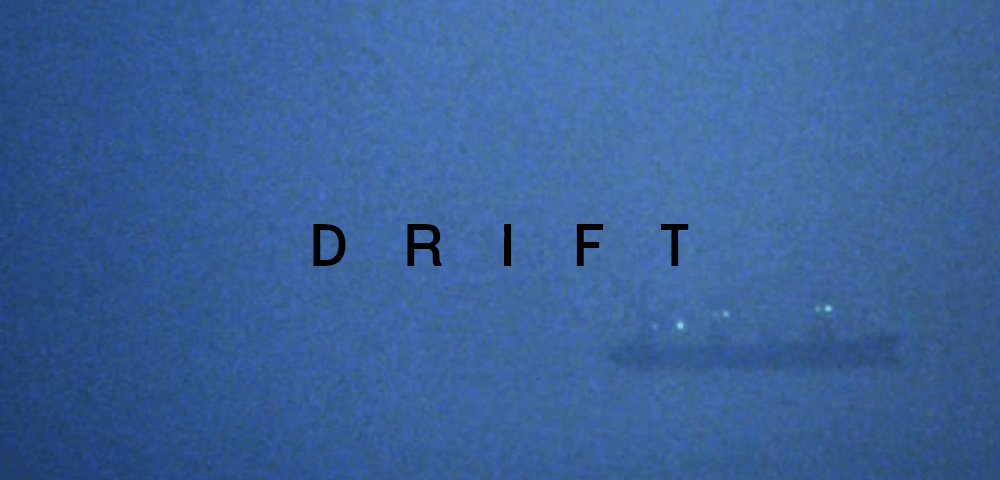
DRIFT
Dir. Chris Welsby, 1994.
Canada. 17 min.
DRIFT is a gentle sea-side expression of the British-Canadian landscape filmmaker Chris Welsby’s own personal feelings of being adrift at the time of its making. A sense of peaceful melancholy is conveyed through playful panning shots of cargo ships floating off the foggy coast of Vancouver. Where Rimmer framed his images to create impressions of distance and shifting color pallettes, Welsby renders the same coastline as a flat monochrome canvas. The morning winter light erases the horizon line and forms a blue and gray plane textured in scintillations of film emulsion and ocean tide.
“It is at this time more than any other when, lacking a clearer point of reference, one’s attention is drawn to the large cargo ships which anchor in the bay. Sometimes, in clearer weather, the ships dominate the landscape. At other times, when the fog moves in, the landscape dominates the ships. On some days they assume a monumental, sculptural presence, testimony to the technological domination of the environment. At other times they are no more than grey, ghostly shapes, only half-seen in the swirling fog.” –Chris Welsby
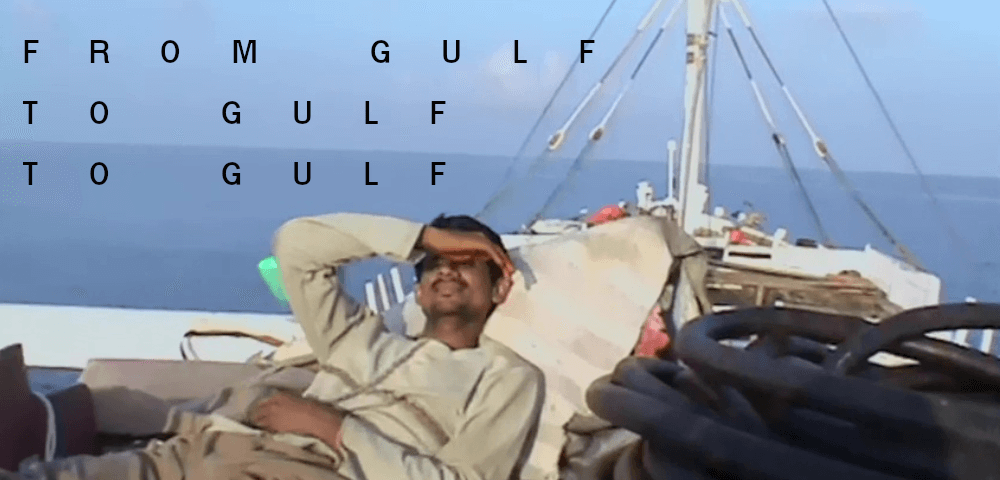
FROM GULF TO GULF TO GULF
(KUTCHI VAHAN PANI WALA)
Dirs. Shaina Anand and Ashok Sukumaran (CAMP), 2013.
United Arab Emirates, India, Yemen, Somalia, Qatar, Pakistan, Oman, Kuwait, Kenya, Iraq, Iran. 83 min.
In Kutchi, Arabic, Urdu, and Hindi with English subtitles.
TUESDAY, JULY 9 – 10 PM
SATURDAY, JULY 13 – 7:30 PM
WEDNESDAY, JULY 17 – 10 PM
MONDAY, JULY 29 – 7:30 PM
FROM GULF TO GULF TO GULF presents an alternative world of maritime shipping, made in collaboration between Mumbai based artist group CAMP and a littoral, muslim seafaring society on the Gulf of Kutch in the state of Gujarat.
Assembled from a collection of videos shot on a wide range of formats, the film, structured as a season on the sea, tells a year in the life of shipping break-bulk cargo in the Western Indian Ocean between the gulfs of the Persia, Aden and Kutch and the Red Sea, where men sail on large community and family-made wooden vessels as they encounter storms, sea creatures, and fellow boats and sailors. The result is an ebullient adventure and political exercise that profiles the humor, ingenuity, and desires of a precarious workforce as they conduct a vital form of free trade independent of the shipping container, one that cuts through the twin phenomena of sanctions and piracy. It is also a musical.
“CAMP’s film does not seek to map the network but a network –a privately linked sub-culture of sharing. And yet the ephemeral existence of this media –its precarious life between phones and onboard bluetooth connections– renders CAMP’s film an inadvertent archive of sorts, preserving these videos before they are deleted or lost.” –Leo Goldsmith
Special thanks to the generous advice, assistance, and contributions of Shaina Anand, Danielle Burgos, Connor Burns, Kellen Dye, Alfred Giancarli, Leo Goldsmith, Mauro Herce, Rachel Howard, Bob Hunter, Jay Kuehner, Toby Lee, Erika Magnusson and Daniel Andersson, Stephanie Monohan, Yuri Pattison and Tiffany Sia, Jacques Perconte, Kazu Watanabe, and Winsor Ytterock.

One thought on “HEAVY METAL CONTAINERS”
Comments are closed.